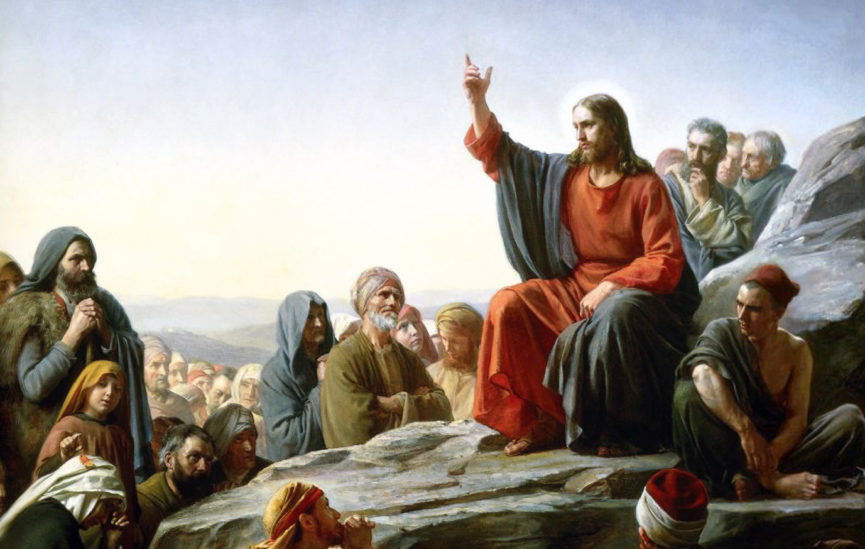Depiction of Jesus preaching his famous “Sermon on the Mount” on a hill overlooking the northern shore of the Sea of Galilee.
Photo: Carl Bloch, Public domain, via Wikimedia Commons
All are called to evangelise
Before Jesus ascended into heaven, He gave His disciples the Great Commission to evangelise to all the nations. In the spirit of Pentecost, Monsignor Ambrose Vaz speaks about the importance of not just being called, but also our response to the call.
There are two very important prerequisites to evangelising: being aware that you are called by God, and saying “yes” – responding deliberately and intentionally.
Jesus calls all of us
In the Gospel of Matthew, Jesus tells His disciples His will before ascending into heaven. He gave His disciples these three instructions: to make disciples of all nations; to baptise them in the name of the Father, the Son, and the Holy Spirit; and to observe everything He commanded. As affirmation, He also reminded them that they would not be alone. Just as Jesus instructed His disciples, so too does He call each of us to evangelise. That is the determining factor of a successful evangeliser – the realisation that God goes with us. The evil one tries to make us forget this and we get discouraged when our efforts fail, but we must always remember Jesus’ promise, even when we feel like giving up: “I am with you.” This dynamic is important because if evangelisation is a decision I have made on my own, I will simply do what I decide is best. But if I realise that the initiative does not come from me, but rather from God, then I have to follow His agenda, not my own. Unfortunately, in Church ministries, many of us very often forget this. We forget that God is the one who has called us, and instead, only remember being invited by a friend or a priest to serve in a ministry. In actuality, the one calling us is God. He may have used an interest of yours, or a close friend, but you need to discern and recognise that these are the ‘props’ that God has used to remind you of your call. You have to realise and remember that He is the one calling you. This means you are accountable to Him.
Intentional discipleship
Being called is important, but equally important is the next step, to be a disciple of the One calling you to action. You cannot tell others about someone whom you do not know intimately. We are called to do much more than to superficially share information about the faith. We are called to give others an experience of God’s love. In St Luke’s Gospel, Jesus says, “Whoever is not with me is against me, and whoever does not gather with me scatters.” (Luke 11:23) In those days, they wore long robes, and by walking into the field, a person would damage all the grains that were to be harvested, and they would be lost. So if you are not intentionally going to harvest, you should not enter the field: you will only make things worse. If you are not proactive in wanting to carry out His will, you are actually doing just the opposite. But what kind of evangeliser are you – active or passive? This makes a difference. The more passive disciples or evangelisers I see, the less impressed I will be with the faith. Or, if you claim to be a member of a club, but you are never there in its uniform or do not participate in its activities, I will get the impression that it is simply not worth it. Even before getting to know it, I would already be disinterested in the club.
To be an evangeliser, I have to be an intentional disciple. I have to be in love with the Master, to have an intimate relationship with Him. To be a disciple requires us to be called, and to respond to it. Jesus said, “You did not choose me, no, I chose you” (John 15:16). What is our response? The best example we can find in Scripture is from Jesus Himself, “Here am I, Lord, I come to do your will.” (Hebrews 10:7)
“We are called to do much more than to superficially share information about the faith. We are called to give others an experience of God’s love.”
Call, identity and mission
In his letter to the Galatians, Saint Paul clearly introduces himself as “an apostle (identity) sent (mission) neither by human commission nor from human authorities, but through Jesus Christ and God the Father (call).” (Galatians 1:1) Our call, and our mission, is to evangelise. And our identity as Jesus’ disciples is connected to this call. Knowing and remembering this will impel us to carry out our mission regardless of any discouragement that we may face.



 Clarice Chan, Chairwoman, Original Minds Group
Clarice Chan, Chairwoman, Original Minds Group










 Producer-Presenter, CatholicSG Radio
Producer-Presenter, CatholicSG Radio